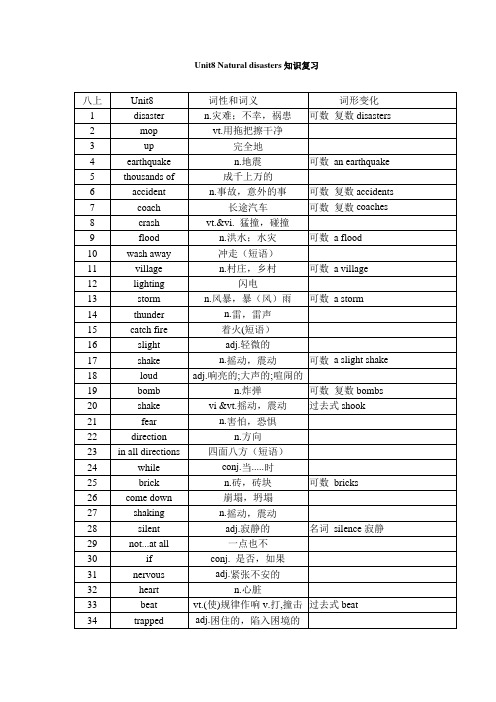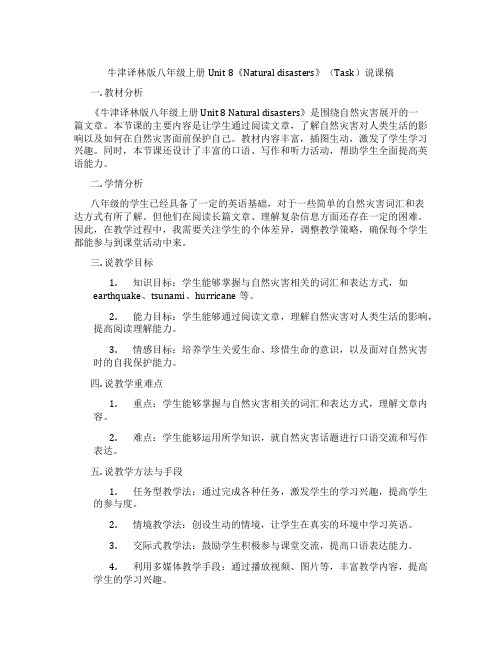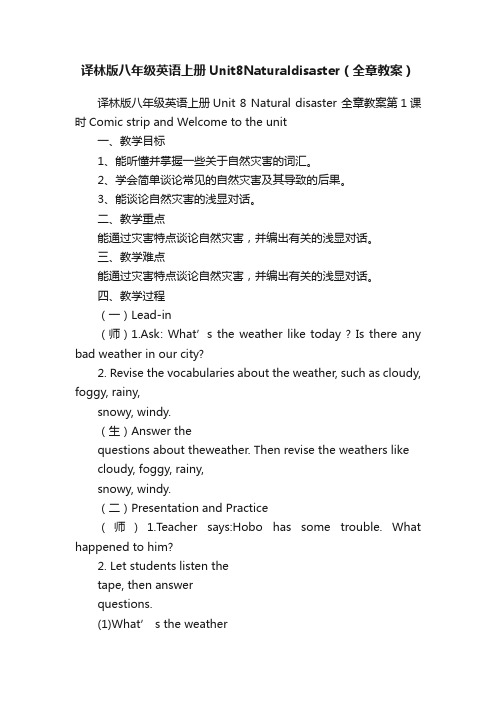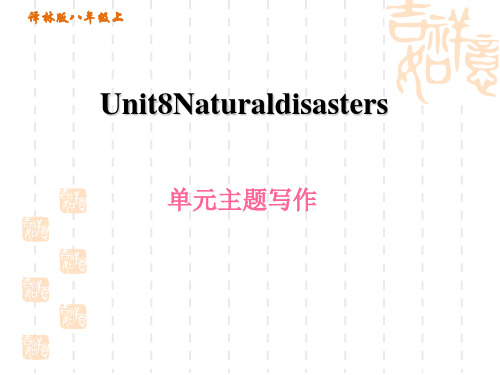最新2019八年级英语上册 Unit 8 Natural disasters Period 2 Reading I听写本 (最新版)牛津版
牛津新版2019年秋八年级英语上册Unit 8 Natural disasters词汇与语法基础训练附答案

牛津新版2019年秋八年级英语上册Unit 8 Natural disasters词汇与语法基础训练一、必背词汇disaster n. 灾难;不幸,祸患mop vt. 用拖把擦干净up adv. 完全地earthquake n. 地震accident n. 事故,意外的事coach n. 长途汽车crash vi. & vt. 猛撞;碰撞flood n. 洪水,水灾village n. 村庄,乡村lightning n. 闪电storm n. 风暴,暴(风)雨thunder n. 雷,雷声slight adj. 轻微的shake vi. & vt. 摇动,震动loud adj. 响亮的;大声的;喧闹的bomb n. 炸弹fear n. 害怕,恐惧direction n. 方向brick n. 砖,砖块silent adj. 寂静的nervous adj. 紧张不安的heart n. 心脏beat vi. & vt. (使)规律作响,作节奏运动trapped adj. 困住的mind n. 头脑calm vi. & vt. (使)平静,(使)镇定since conj. 由于,既然still adv. 仍然alive adj. 活着的dark n. 黑暗shout n. 呼喊,喊叫声safe adj. 安全的asleep adj. 睡着的break vi. 损坏;打破towel n. 毛巾,浴巾rule n. 规则railway n. 铁路pancake n. 烙饼,薄饼burn n. 烧伤,烫伤,灼伤board n. 木板headache n. 头痛toothache n. 牙痛countryside n. 乡下, 农村nearly adv. 几乎,将近clear vt. 清除,清理shaking n. 摇动,震动二、重点词汇1. break verb /breɪk/1). to (cause something to) separate suddenly or violently into two or more pieces,or to (cause something to) stop working by being damaged破碎,破裂;打破;打断;损坏,弄坏例句:The dish fell to the floor and broke.碟子掉到地上摔碎了。
八年级英语上册Unit8Naturaldisasters重点词组整理

Unit 8 Natural disastersWelcome to the unit1. 自然灾害natural disasters2. 湿透了 be all wet3. 醒来,把某人叫醒 wake up, wake sb up4. 把水拖干净mop up the water5. 输了决赛lose the final6. 成千上万的人 thousands of people7. 一次车祸 a car accident8. 撞上一棵树 crash into a tree9. 冲走wash away (代词放中间)10. 引起一场大火,着火start a big fire, catch fire11. 从树上摔下fall from/ off a tree 12. 伤了腿hurt one’s leg13. 听说过那次火灾hear about the fire14. 电闪雷鸣的大暴雨 a heavy storm with thunder and lightning15. 雨开始下时我正在睡觉。
I was sleeping when it started to rain/ when the rain started..16. 如果我不带你回家,谁将水拖干净呢?Who will mop up the water if I go home without you. 17. 闪电击中了一幢教学楼,着火了。
Lightning hit a classroom building and it caught fire.18. 20个人死于一场大暴雨。
A big storm killed 20 people.= 20 people died in a big storm.= 20 people lost their lives in a big storm.Reading1. 在凌晨in the early morning2. 感到一阵轻微的晃动feel a slight shake3. 听到像打雷般的响声hear a loud noise like thunder4. 像地底下的炸弹like bombs under the ground5. 惊恐地尖叫scream in fear6. 跑出大楼run out of the building7.. 尽力做某事try one’s best to do sth8. 四处逃散 run in all directions9. 掉下,落下fall down 10. 倒塌,崩溃come down11. 一点也不not … at all12. 觉得紧张feel nervous13. 被困住be trapped 14. 自言自语say to oneself 15. 还活着be / stay alive 16. 平静下来calm down17. 呼救shout/ scream for help18. 在黑暗中缓慢向前挪动身体pall oneself slowly through the dark19. 设法找到出路try to find one’s way out20. 我上面的声音the noise above me21. 激动的人们的叫声shouts from excited people22. 搬开砖块move away the bricks23. 两边晃动move from side to side24. 上下移动move up and down25. 最后at last= finally = in the end26. 看到明亮的日光see the bright daylight27. 惊恐地尖叫scream in fear28. 听到他的呼救声hear his cry for help29. 地震开始时我正在睡觉。
Unit8Naturaldisasters知识复习牛津译林版八年级英语上册

Unit8 Natural disasters知识复习巩固练习一.单项选择()1.The floor is quite wet. My teacher asked us quickly.A.mop up itB.mopped it upC.to mop it upD.to mop up it()2.—What should I do when the earthquake happens, Dad?—First of all, it’s important to and hide yourself in the corners of the room.A.calm downB.put downC.get downD.fall down()3.—did the accident happen?—While we a Chinese lesson yesterday.A.When; have hadB.While; are havingC.When; were havingD.While; have()4.—What happened your uncle?—His car crashed a tree on his way back home yesterday evening.A.to; toB.with; toC.to; intoD.of; under()5.I was writing a diary my brother was watching TV yesterday evening.A.beforeB.afterC.untilD.while()6.—Uncle Wang, I dropped by your home at 6:00 p.m. yesterday, but nobody was in.—Oh, I a meeting.A.was havingB.am havingC.will haveD.have had()7.He felt so that he fell soon.A.sleepy; asleepB.asleep; sleepyC.sleeping; asleepD.sleepy; sleepy()8. wonderful The Reader is! Many people enjoy the TV programme.A.WhatB.How aC.HowD.What a()9.—The picture of the Snowflake Boy was very popular in 2018.—Yeah, it received Internet hits.A.thousands ofB.thousandC.hundredD.hundreds()10.You’ll get better grades you follow the teachers’ advice.A.ifB.untilC.thoughD.while()11.While Xiao Ming his homework, his mother came with a cup of tea.A.has doingB.has doneC.is doingD.was doing()12.As I to take photos of the little cat, suddenly a big snowball me.A.was trying; was hittingB.tried; was hittingC.was trying; hitD.was tried; hit()13.This washing machine . It needs to be repaired.A.worked wellB.broke downC.ran upD.went on()14.According to a recent survey, three-fifths of working mothers in China don’t want to hav e a second child.A.mostlyB.especiallyC.partlyD.nearly()15.His grandfather did his best to keep the tree but it died in the end.A.aliveB.asleepC.absentD.awake( )16. We were walking slowly when a strong blew from behind.A. windB. cloudC. stormD. snow( )17. There are some bricks on the road. Let’s them, or there may be traffic accidents.A. carryB. clearC. catchD. fix( )18. I was working hard on the problem when a wonderful idea suddenly went____ my mind.A. inB. overC. acrossD. through( )19. At the beginning of the exam, it was hard for me to calm down. I could feel my heartfast.A. shakingB. beatingC. jumpingD. running( )20. — Were you when you were playing in the final?— Not at all. I was quite sure that our team would win.A. excitedB. interestedC. calmD. nervous( )21. — Which of the following words is NOT a compound word?—is.A. ToothacheB. CarelessC. RailwayD. Rainstorm( )22. An earthquake happened in Ya’an Sichuan in April 2013. peoplelost their houses in it.A. ThousandsB. Thousand ofC. Thousands ofD. Thousand( )23. — Do you know if it tomorrow?— I am not sure. It may snow if the temperature below zero.A. snows; will dropB. will snow; will dropC. will snow; dropsD. snows; drops( )24. Tom didn’t hear the car because he ________ music through headphone.A. listened toB. was listening toC. was listen toD. is listening to( )25. The boy was running towards his mother _________ he suddenly fell over.A. afterB. whileC. whenD. as( )26. A football me when I past the football field. My arm still hurts now.A. hit; was walkingB. was hitting; was walkingC. was hitting; walkedD. hit; am walking( )27. — We plan to drive our car to Dalian next month.— Are you joking? What if it ?A. breaks awayB. breaks downC. breaks upD. breaks off( )28. from the smoke, you should stay low to the ground while running out of a burning house.A. To keeping awayB. To keep awayC. Keep awayD. Keeping away( )29. As Tom is a brave boy, he knows how to stay calm when there is danger.Which word can replace (代替) “As” here?A. SoB. SinceC. UntilD. If( )30. — A typhoon called Usagi (天兔) hit Guanddong Province and it killed 30 people.— ________________It was really a terrible disaster.A. They were too careless.B. Thank goodness!C. Never mind.D. I am sorry to hear that.( )31. —Linda, I called you this morning, but nobody answered the phone.—I’m sorry. I ______ football with my friends then.A. playB. playedC. am playingD. was playing( )32. The birds flew away ______every direction as soon as they found themselves ______.A. in; in dangerB. to;dangerousC. to;in dangerD. in; dangerous( )33. If you ______,I’ll ______ by myself.A. don’t come; mop up itB. won’t come; mop it upC. don’t come; mop it upD. won’t come; mop up it( )34. Mr Su was driving in the snowstorm ______his car crashed into a tree.A. whenB. asC. whileD. as soon as( )35. —I’m sorry I ______m y exercise book at home.—Don’t forget______ it to school tomorrow, please.A. forgot;to takeB. left;to bringC. forgot; to bringD. left;to take( )36. —I’m really ______before the competition.—Take it easy. Sure you are the best.A. coolB. seriousC. nervousD. patient( )37, The earthquake ______when I ______some cleaning,A. starts;was doingB. started; was doingC. was starting; was doingD. starts; were doing( )38. —My brother hurt his legs when he rode his bike on the way back home. —______.A. That’s too badB. He is very carelessC. Be careful next timeD. Tm sorry to hear that( )39. The government of Linyi is building _____cheap and good houses for the people.A. thousandB. thousandsC. thousand ofD. thousands of( )40. —______will the film begin? —_______ half past seven.A. How long;Not untilB. How soon;UntilC. How long;UntilD. How soon;Not until二.完成句子1.蝴蝶朝四面八方飞去。
牛津译林版八年级上册Unit 8《Natural disasters》(Task)说课稿

牛津译林版八年级上册Unit 8《Natural disasters》(Task)说课稿一. 教材分析《牛津译林版八年级上册Unit 8 Natural disasters》是围绕自然灾害展开的一篇文章。
本节课的主要内容是让学生通过阅读文章,了解自然灾害对人类生活的影响以及如何在自然灾害面前保护自己。
教材内容丰富,插图生动,激发了学生学习兴趣。
同时,本节课还设计了丰富的口语、写作和听力活动,帮助学生全面提高英语能力。
二. 学情分析八年级的学生已经具备了一定的英语基础,对于一些简单的自然灾害词汇和表达方式有所了解。
但他们在阅读长篇文章、理解复杂信息方面还存在一定的困难。
因此,在教学过程中,我需要关注学生的个体差异,调整教学策略,确保每个学生都能参与到课堂活动中来。
三. 说教学目标1.知识目标:学生能够掌握与自然灾害相关的词汇和表达方式,如earthquake、tsunami、hurricane等。
2.能力目标:学生能够通过阅读文章,理解自然灾害对人类生活的影响,提高阅读理解能力。
3.情感目标:培养学生关爱生命、珍惜生命的意识,以及面对自然灾害时的自我保护能力。
四. 说教学重难点1.重点:学生能够掌握与自然灾害相关的词汇和表达方式,理解文章内容。
2.难点:学生能够运用所学知识,就自然灾害话题进行口语交流和写作表达。
五. 说教学方法与手段1.任务型教学法:通过完成各种任务,激发学生的学习兴趣,提高学生的参与度。
2.情境教学法:创设生动的情境,让学生在真实的环境中学习英语。
3.交际式教学法:鼓励学生积极参与课堂交流,提高口语表达能力。
4.利用多媒体教学手段:通过播放视频、图片等,丰富教学内容,提高学生的学习兴趣。
六. 说教学过程1.导入:以一段关于自然灾害的视频导入,激发学生的学习兴趣。
2.阅读理解:学生阅读文章,回答相关问题,了解自然灾害对人类生活的影响。
3.词汇学习:学生通过小组合作,归纳总结文章中出现的自然灾害词汇。
牛津译林版八年级上册Unit 8《Natural disasters》(Task)教学设计

牛津译林版八年级上册Unit 8《Natural disasters》(Task)教学设计一. 教材分析牛津译林版八年级上册Unit 8《Natural disasters》主要介绍了自然灾害,包括地震、洪水、台风等,通过学习本单元,学生可以掌握有关自然灾害的词汇和表达方式,了解自然灾害发生的原因及应对措施。
Task部分要求学生阅读一篇关于自然灾害的文章,然后进行相关练习,培养学生的阅读能力和解决问题的能力。
二. 学情分析八年级的学生已经具备了一定的英语基础,能够进行简单的阅读和交流。
但部分学生在阅读长篇文章时,可能会遇到生词和语法难题,影响阅读理解。
此外,学生对于自然灾害的了解程度不一,需要教师在教学中进行引导和补充。
三. 教学目标1.知识目标:学生能够掌握有关自然灾害的词汇和表达方式,了解自然灾害发生的原因及应对措施。
2.能力目标:学生能够阅读并理解关于自然灾害的文章,提高阅读能力;通过任务型教学,培养学生的解决问题能力。
3.情感目标:培养学生关爱生命,关注自然的意识,提高学生应对自然灾害的能力。
四. 教学重难点1.重点:学生能够掌握有关自然灾害的词汇和表达方式,阅读并理解关于自然灾害的文章。
2.难点:学生能够运用所学知识,解决实际问题,提高应对自然灾害的能力。
五. 教学方法1.任务型教学法:通过任务型教学,让学生在实践中掌握知识,提高能力。
2.情境教学法:创设情境,让学生在真实的环境中学习,提高学生的学习兴趣。
3.合作学习法:引导学生进行小组合作,培养学生的团队精神和沟通能力。
六. 教学准备1.教师准备:提前准备关于自然灾害的文章,整理相关词汇和表达方式,设计任务型练习。
2.学生准备:预习课文,了解自然灾害的基本知识,准备参与课堂活动。
七. 教学过程1.导入(5分钟)教师通过提问方式引导学生谈论自然灾害,激发学生的学习兴趣。
例如:“你们知道哪些自然灾害?它们发生的原因是什么?”2.呈现(10分钟)教师呈现关于自然灾害的文章,让学生快速阅读,了解文章大意。
译林版八年级英语上册Unit8Naturaldisaster(全章教案)

译林版八年级英语上册Unit8Naturaldisaster(全章教案)译林版八年级英语上册Unit 8 Natural disaster 全章教案第1课时Comic strip and Welcome to the unit一、教学目标1、能听懂并掌握一些关于自然灾害的词汇。
2、学会简单谈论常见的自然灾害及其导致的后果。
3、能谈论自然灾害的浅显对话。
二、教学重点能通过灾害特点谈论自然灾害,并编出有关的浅显对话。
三、教学难点能通过灾害特点谈论自然灾害,并编出有关的浅显对话。
四、教学过程(一)Lead-in(师)1.Ask: What’s the weather like today ? Is there any bad weather in our city?2. Revise the vocabularies about the weather, such as cloudy, foggy, rainy,snowy, windy.(生)Answer thequestions about theweather. Then revise the weathers like cloudy, foggy, rainy,snowy, windy.(二)Presentation and Practice(师)1.Teacher says:Hobo has some trouble. What happened to him?2. Let students listen thetape, then answerquestions.(1)What’ s the weatherlike ?(2)What was Hobo doing when it started to rain?(3)What did Hobo seeWhen he woke up?(4)Why doesn’t he wantto go home alone?3. Let students repeat the tape.4.Explanation.教师简单解释was sleeping的用法,引入过去进行时概念。
八年级英语上学期期末复习 Unit 8 Natural disasters

八年级英语期末复习——8A Unit 8Important phrases and sentences:1. disaster n. 灾难;不幸,祸患 natural disasters 自然灾害2. mop vt. 用拖把擦干净(mopped mopping)up adv 完全地 mop up / eat up /clean up /use upmop up 拖干,把......拖干 (mop it /them up)eg. Hobo wants Eddie to mop up all the water.3.earthquake n. 地震 an earthquake in the earthquake eg. There was an earthquake in Sichuan in 2008.4. 1)thousands of 成千上万的 /hundreds of 成百上千的 / millions of 成百万的 +名词复数eg. Thousands of people lost their lives in the earthquake.There are thousands of people on the road.2)数词+hundred/thousand/million+名词复数There are three thousand students in our school.5. accident n. 事故,意外的事 eg. There was a car accident yesterday.昨天有一场交通事故。
A car accident killed three men three days ago.Three men lost their lives in the car accident three days ago. 在三天前的一场交通事故中三人丧生。
6. coach n. 长途汽车(coaches) get on/off the coachIt took us three hours to go to Nanjing by coach. .7. crash vi. & vt. 猛撞;碰撞 crash into 猛撞,碰撞eg. A car crashed into a tree last night. 昨天晚上一辆车猛撞到一棵树上。
译林牛津版八年级上册英语 Unit 8 Natural disasters 单元主题写作

Forsafety
,
__________________________________________________
wemovedourdinningtableoutofourhouseandsatonit.
__________________________________________________
Justthen,thehousestartedtoshake. Wewereveryafraidandranawayquickly. Thefollowingmorning, wewentbackhome.
Wefoundthattherewasnohouseatall. esofglassandbrickseverywhere.
请根据以下提示,以“Aterribleflood”为题,写一篇80词 左右的文章。包括以下要点。
1. 连续20天的暴雨导致了洪水。 2. 昨天晚上,洪水袭击了我们村,我们一家正在睡觉。 醒来后发现到处是水。 3. 安全起见,我们把餐桌移出房子,坐在餐桌上。 4. 洪水冲走了房子,很多人流离失所。 5. 半小时后警察来了,救了我们和很多村民。
译林版八年级上
Unit8Naturaldisasters
单元主题写作
Wefeltverysad.
步骤 构思
列纲
介绍山崩的时 Last Monday 1 间地点原因 morning. . .
山崩发生时我 very afraid,leave
2 们的反应
quickly with
umbrellas
山崩对我家造 no house, pieces of
Thefloodwashedawaymanyhouses. Manypeoplelosttheirhome.
八级英语上册Unit8NaturaldisastersGrammar课件(新版)

A. is working
(2014·无锡市)
√B. was working
C. has worked
D. had worked
EntranPractice
5. Susan and Lily _____ tomatoes and other
Lead-in
The past continuous tense
过去进行时
What’s the rule?
Discovering
◇Look at the sentences. He was watching TV at nine yesterday. We were sleeping when you came. She was cooking dinner at that time. They were playing football that afternoon. You were reading when the telephone rang. I was washing my car at this time yesterday.
Practice
1. —Was Kate at the party last night?
—Yes, she _____ a really nice dress.
(2013·盐城市)
2019最新八年级英语上册 Unit 8 Natural disasters Period 1 Comic strip

Unit 8 Natural disastersPeriod 1 Comic strip & Welcome to the unit重点单词1.disaster n. 灾难;不幸,祸患2.mop vt. 用拖把擦干净3.up adv. 完全地4.earthquake n. 地震5.accident n. 事故,意外的事6.coach n. 长途汽车7.crash vi.& vt. 猛撞;碰撞8.flood n. 洪水,水灾9.village n. 村庄,乡村10.lightning n. 闪电11.storm n. 风暴,暴(风)雨12.thunder n. 雷,雷声13.village n.—villager n.14.mop v.—过去式 mopped15.coach n.—coaches pl.重点短语1.mop up 擦干2.wash away 冲走3.crash into…撞到……4.thousands of people 成千上万的人5.hear about 听说6.catch fire 着火重点句型1.I was sleeping when it started to rain.我正在睡觉,突然开始下雨了。
2.Who will mop up the water if I go home without you? 如果我不带你回家,谁来把水擦干净呢?公交小句1.He was playing with his friends when I saw him.当我看见他的时候,他正在和他的朋友们玩。
2.You have spilt the milk so you must mop it up.你把牛奶洒出来的,所以你必须清理干净。
- 1、下载文档前请自行甄别文档内容的完整性,平台不提供额外的编辑、内容补充、找答案等附加服务。
- 2、"仅部分预览"的文档,不可在线预览部分如存在完整性等问题,可反馈申请退款(可完整预览的文档不适用该条件!)。
- 3、如文档侵犯您的权益,请联系客服反馈,我们会尽快为您处理(人工客服工作时间:9:00-18:30)。
Unit 8 Natural disasters
Period 2 Reading Ⅰ
重点单词
根据汉语意思,写出相应的英文单词
1.轻微的
2.摇动,震动
3.响亮的;大声的;喧闹的
4.炸弹
5.害怕,恐惧
6.方向
7.当……的时候,和……同时
8.砖,砖块
9.摇动,震动
10.寂静的
11.是否
12.紧张不安的
13.心脏
14.(使)规律作响,作节奏运动
15.困住的
16.头脑
17.(使) 平静,(使) 镇定
18.由于,既然
19.仍然
20.活着的
21.黑暗
22.呼喊,喊叫声
23.日光
24.安全的
25.睡着的
26.在……以后
根据要求,写出下列单词的变形
27.silent adj.—n.
28.safe adj.—adv.—n.
29.direction n.—v.
30.trapped adj.—v.
31.asleep adj.—v.
重点短语
根据汉语意思,写出相应的英文短语
1.惊恐地
2.跑出……
3.四面八方
4.落下
5.崩塌,坍塌
6.冷静
7.大声呼救
8.找到出路
9.搬开
10.自言自语。
